Cancer: The Great Equalizer
 Thursday, August 5, 2010 at 12:02PM
Thursday, August 5, 2010 at 12:02PM 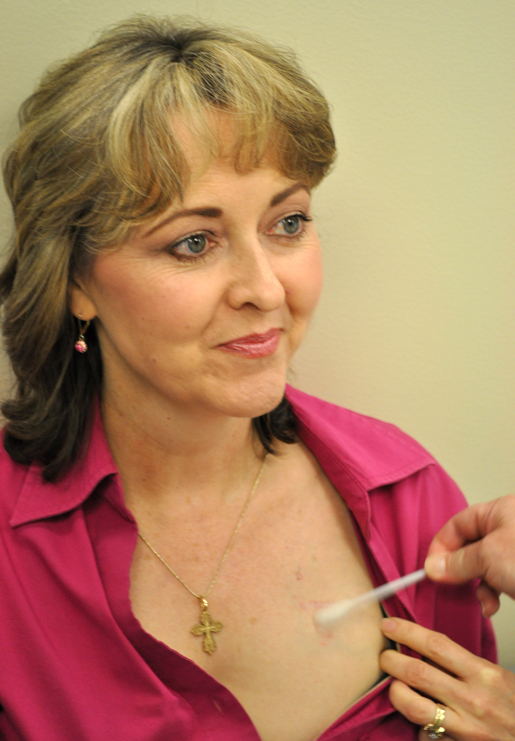 (Left: Getting ready to have blood taken from my port-a-cath during a recent follow-up visit with my oncologist. To view more photos, please click here.)
(Left: Getting ready to have blood taken from my port-a-cath during a recent follow-up visit with my oncologist. To view more photos, please click here.)
I haven’t written much lately about cancer, probably because I’ve entered that phase of post-treatment known as “the new normal.” And it just so happens that today is the second anniversary of my first surgery for breast cancer.
One of the things that has changed--probably the biggest change, actually—is that life has taken on an almost imperceptible urgency. For example, before cancer (I’ll call it “BC”), I would think about doing things, going places, or working on particular attributes that I wanted to acquire. You know, the typical, “Oh, I’ve always wanted to (fill in the blank)" . . . travel to Ireland, visit the Smithsonian, become a writer, have a career that is more about helping people, learn about photography, be more charitable, etc.
BC, I would think these things, but rarely would I make any real attempt to make them happen. In many ways over the last year, I’ve worked to change that. This sense of urgency has contributed to a surprising lack of patience on my part. What a shock! BC, I assumed that going through cancer treatment would have made me more patient, more loving, more virtuous.
I would like to think that I am in the process of gaining those attributes, but the truth is that since cancer, I’ve realized that I don’t have time to pussy foot around with life. I don’t have time for the woulda-coulda-shouldas, or the “I’ll do that someday when I retire” concept. I no longer take it for granted that I will reach the age of retirement.
This has caused a tension in my life. On one hand, I feel more selfish in that I want to "get the show on the road" with all of the things I've always wanted to do before I die. On the other hand, I'm gripped by a certain amount of alarm--even a subconscious terror--because I realize I have such a short amount of time left to acquire virtues and understand how to live in "peace and repentance" before God.
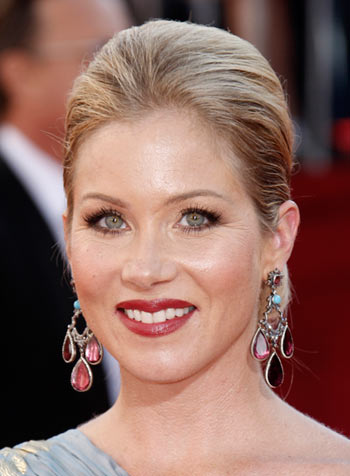 It gave me solace to read an article recently where actress Christina Applegate said that beating breast cancer motivated her to "make things happen." (The actress underwent a double mastectomy in July 2008 after being diagnosed with the disease.)
It gave me solace to read an article recently where actress Christina Applegate said that beating breast cancer motivated her to "make things happen." (The actress underwent a double mastectomy in July 2008 after being diagnosed with the disease.)
She explained, "I think the urgency to have a good life is definitely a stronger element in my life now than it was before. I think I meandered, waiting for something to happen. Now I really try to make things happen right now."
And since recovering, the actress admitted she was learning to say "no" a lot more. "I allow myself to get angry now, which I don't think I ever did, to feel whatever it is you're feeling and speak your mind," she said.
Upon reading her words, I felt a sense of kinship with a fellow survivor who gave voice to my sentiments. It’s good to know that I’m not alone in my feelings.
Many of you may be familiar with Christopher Hitchens, a well-known author and journalist who specializes in diatribes against religion, God, and conservatives (he is a regular contributor to Vanity Fair magazine and wrote the book, God Is Not Great). Say what you will about him--he’s very articulate and rather entertaining, even if arrogant. Surprisingly, he was an outspoken supporter of the war in Iraq. Christopher Hitchens is not the kind of guy who simply tows the party line.
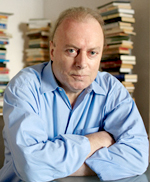 Sadly, Hitchens was diagnosed with cancer in June and wrote about his experience in a recent article for Vanity Fair. He writes: “I can’t see myself smiting my brow with shock or hear myself whining about how it’s all so unfair: I have been taunting the Reaper into taking a free scythe in my direction and have now succumbed to something so predictable and banal that it bores even me. Rage would be beside the point for the same reason. Instead, I am badly oppressed by a gnawing sense of waste. I had real plans for my next decade and felt I’d worked hard enough to earn it. Will I really not live to see my children married?”
Sadly, Hitchens was diagnosed with cancer in June and wrote about his experience in a recent article for Vanity Fair. He writes: “I can’t see myself smiting my brow with shock or hear myself whining about how it’s all so unfair: I have been taunting the Reaper into taking a free scythe in my direction and have now succumbed to something so predictable and banal that it bores even me. Rage would be beside the point for the same reason. Instead, I am badly oppressed by a gnawing sense of waste. I had real plans for my next decade and felt I’d worked hard enough to earn it. Will I really not live to see my children married?”
Since Hitchens’ cancer has metasticized, he has good reason to ask these questions. I never thought I would feel solidarity with the likes of Christopher Hitchens, but I do. His straight-forward reporting from the trenches of cancer treatment resonates with people like me who asked (and continue to ask) the same questions. I especially related to the following:
“Myself, I love the imagery of struggle. I sometimes wish I were suffering in a good cause, or risking my life for the good of others, instead of just being a gravely endangered patient. Allow me to inform you, though, that when you sit in a room with a set of other finalists, and kindly people bring a huge transparent bag of poison and plug it into your arm, and you either read or don’t read a book while the venom sack gradually empties itself into your system, the image of the ardent soldier or revolutionary is the very last one that will occur to you. You feel swamped with passivity and impotence: dissolving in powerlessness like a sugar lump in water.”
It’s that last sentence that most aptly describes one’s gut reaction to treatment. You can be the hottest commodity around, a wheeler dealer, a sexpot, a VIP—but cancer (like death) is the Great Equalizer. It teaches you to accept your vulnerability, to even embrace it. Just as important, it teaches you to depend upon and accept the aid of the people God has placed around you. In the end, this is a great gift, something I would compare to becoming a parent. As a single, my life was about me, my wants, my desires, my happenings. As a parent, out of necessity, I was forced to sacrifice my wants, my desires, my happenings, for the sake of “other.” In so doing, I found more reward, more love, more fulfillment than I ever did when life revolved around myself. And so it is with embracing the vulnerability and interdependence forced upon you during cancer treatment.
This truth hits home every time I visit my oncologist for follow-up exams. If I get too cocky or prideful about myself, my visits to Swedish Hospital Cancer Care Center are a abrupt slap-in-the-face with reality: Yes, you did have cancer; you could get it again; you’d better take care of yourself; live your life now; you could end up here again; stop and smell the roses; a rolling stone gathers no moss (hey, how did that get in there?).
As if those thoughts weren’t enough to hit me over the head with actuality, I invariably meet people who are suffering much more than I ever did. During my visit to Swedish a few days ago, I had conversations with a woman who is being treated for ovarian cancer and another who had surgery and chemo for Stage IV lung cancer. She told me that her doctors are surprised she’s still alive.
It always takes me a day or so to process the whole experience upon my return home. I’m thankful for these visits. They help me to remember. I don’t want to ever forget that God has delivered me—for a time.
"It will steady our faith and help us to trust in times of suffering and trial if we understand that nothing is purposeless, nothing accidental, that nothing is meant to harm us, that everything is intended to help us toward noble character and fuller, richer life."
St. Alexandra the Empress
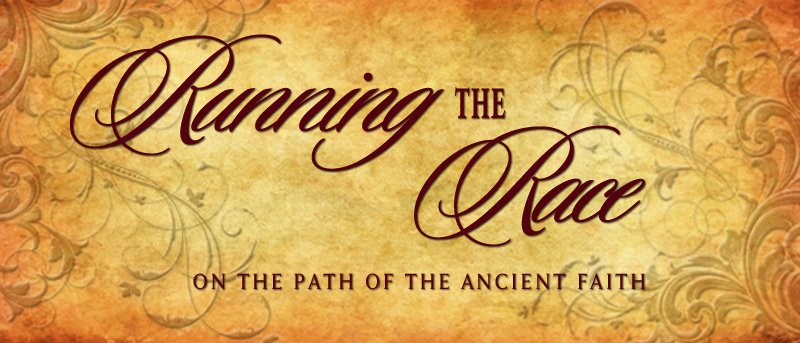
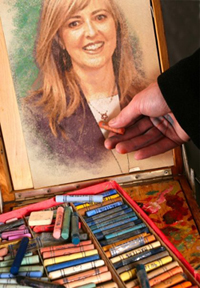


Reader Comments